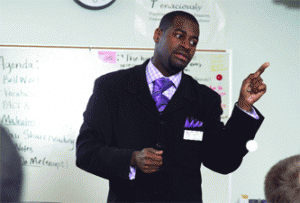There are just 30 black male headteachers in England’s 21,600 state schools, official figures obtained by the Guardian show, triggering accusations that the country’s education system is “institutionally racist”.
The Department for Education (DfE) revealed that there are 20 black Caribbean or black African male heads in state nurseries and primaries and 10 in secondary schools. There are none in special schools.
The figures from November last year – which do not include academies and which are the latest available – show there are 127 black female headteachers, meaning that one in every 125 heads is a black man or woman.
Headteachers are overwhelmingly white – some 94.7% are white British. Just 0.7% are black Caribbean or black African, despite these ethnic groups making up 2% of England’s population.
Black people are also under-represented among those that have not yet made it to senior leadership posts in schools – 89.3% of teachers in England’s maintained schools are white British, while 1.5% are black Caribbean or black African, the statistics reveal.
Marva Rollins, headteacher of Raynham primary school in Enfield, north London, predicted that it would take another 50 years for the number of black teachers to reach a level that reflects the country’s population. She said it would be another 200 years before the number of black headteachers is broadly in line with the number of black people in England.
“These figures show historical inequalities. When I was at school, 50 years ago in Ilford, Essex, it was not on the agenda for black people to become teachers. It was seen to be a profession that was out of reach for us. To some extent, it is still like that. There is institutional racism.”
Some of the figures were published this week by the DfE as part of a statistical breakdown on the school workforce; others were requested by the Guardian.
It has also been revealed that there are only 19 teachers on one of the main programmes designed to improve aspiring black and ethnic minority headteachers, assistant and deputy heads.
The National College for Leadership of Schools and Children’s Services is a quango that runs Equal Access to Promotion, a scheme that started three years ago and is funded jointly by the agency and the National Union of Teachers. It said 60 headteachers had completed another course to help “minorities” advance to headteacher posts and 45 more would start this autumn.
Other organisations, such as Future Leaders, provide mentoring and coaching but do not have specific programmes.
Toby Salt, deputy chief executive of the National College, said the number of black and ethnic minority teachers on “mainstream training courses” was continuing to rise and that the quango had increased tailored support for minority teachers “as part of our drive to encourage all aspiring heads to step up to school leadership roles”.
Rollins said: “Often black teachers feel they can get to middle leadership positions, but no further. It’s down to the perception that many people have that a headteacher is a white male in a secondary school and a white female in a primary school.” Black teachers are often unfairly overlooked and told they are not ready to be heads, she said.
She said part of the problem was that selection panels, which choose headteachers, are made up of governors, who are predominantly white. “More black teachers could come forward and try to be headteachers, but they feel trapped in middle management and do not have the guidance to overcome this.”
She said black headteachers were “snowed under” by requests from black teachers for mentoring.
Chris Vieler-Porter, a former teacher who is researching for a PhD at the Institute of Education, University of London, on the low representation of black headteachers, agreed that the figures were an “indication of institutional racism”. He said: “It is not racism in a conscious or overt way. This is about the everyday assumptions that are made about the capabilities of black teachers.”
Nicole Haynes, a black deputy headteacher at a secondary school in London, said: “For the middle-class and educated young black person, the private sector offers more opportunities, financial incentives and fewer obstacles.
“Education is still a very traditional institution. How many middle managers are black? Once you enter the teaching profession, there is a lack of promotional opportunities or the roles are quite stereotypical, which will not necessarily lead to senior leadership.”
Russell Hobby, general secretary of the National Association of Head Teachers, said he did not think the education system was institutionally racist. He said the figures showed school governing bodies replicated the kinds of headteachers that they had had in the past. “This is more about inertia than racism,” he said.
Earlier this month Arne Duncan, the US education secretary, told a civil rights organisation that fewer than 2% of his country’s schoolteachers were black men. “And we wonder why our boys are struggling. We need to show these kids that they can also educate people just like them when they grow up.”
David Cameron provoked a row with Oxford University earlier this month during which the university accepted that only one student identified as “black Caribbean” origin was accepted for undergraduate admission in 2009.

